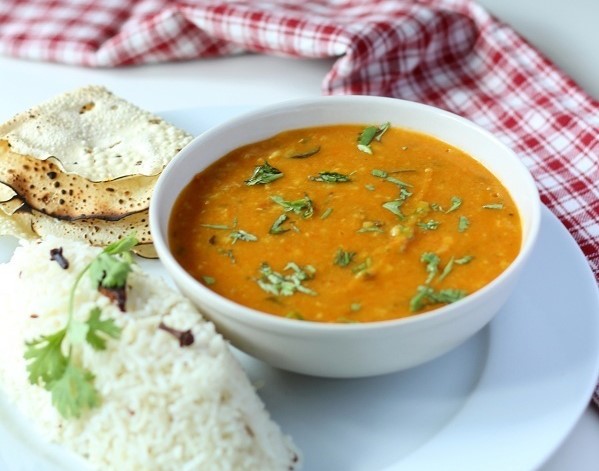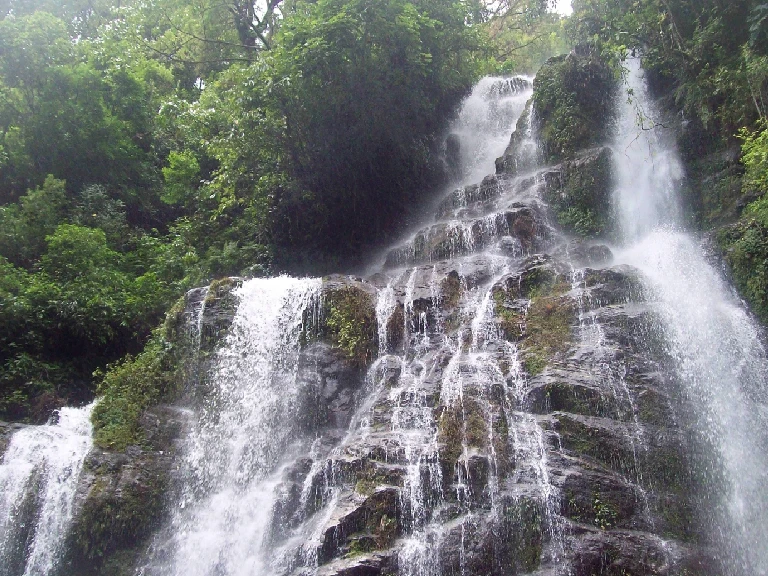The First Supper
I garnish my spicy mutton kasha with a generous sprinkle of chopped shallot and coriander - having accomplished the magnum opus in bengali non-vegetarian, non-pescatarian cuisine, I have earned my stripes as a genuine Bhojohari Manna (the non-pescatarian disclaimer above is required as nothing comes above bhapa ilish, no not even koraishutir kochuri or a cold winter morning).
I must admit, despite my usual modesty, that I have genuinely honed my skills as a chef - it takes me less than half an hour these days to whip up a teriyaki chicken or a pan fried salmon. I guess, with commitment, care and sometimes, a bit of compulsion, one can perfect any work of life. Many of my foodie-fans have often asked me where I learned the finer art of balancing the spices. Indeed, when I look back at where it started, now that is some story to narrate. I did happen to help my mum as an errand-boy in the kitchen since I was a kid, but the real story starts not in the land of luchi and cholar dal, but actually farther away in the country of mustard rabbit and cooked snails - Paris!
More than a decade back now, I had the good fortune of going on an exchange program with four other friends to Paris for a semester. Months of travel, mandated French lessons and free museums aside, there was much I had picked up in those few months. You see, people learn most in their hardest times - as Murakami would write about it, the harshest winters make for the firmest tree rings! And our first challenge right on the night we arrived was not the language, mon ami but the food. Travelling on a Thomas Cook package with a desi chef who will make you your pakodas and samosas wherever you go is one thing, but travelling as students, with an extremely low budget for expenses is another. Add to that, virtually no experience of cooking and you will have one fine story to tell.
I still remember that first night - by eight, by the time we went out to seek a place to eat, the whole world was closed, much to our surprise! The city of lights seemed already asleep and dark. In hindsight, I must agree that the nightlife of Asian cities - be it Bangalore or Bangkok, Mumbai or Manila is incomparable to the best of Europe. The energy that pulsates in the Asian centres - in its food markets and boisterous tourist hotspots - scales a different high altogether. At 12 am on a small island like Langkawi, I had found roadside stalls and restaurants still taking last orders. Cutting chai at 2am in the roads of Mumbai is worth the walk in all seasons. In contrast, monsieur, 8 pm is too late in Paris or Wellington.
Back at our student-stay at the India House, we five friends took the hard call that we had to cook our own dinners. At that moment, we all wished we had packed 10 kilos of Maggi. Which we hadn’t - that led us to resort to a simple meal of dal and rice. I had packed about a few kilos of dal, which I brought immediately to the kitchen. When it came to rice, Gaurav Singh was allocated that part. When I asked him to bring his portion of responsibility, he came back happily with a 1 kilo packet.
When he saw me empty more than half the packet for the night, he asked me with a bit of gulp in his voice, ‘Will you require that much rice for one night itself?’
I did not like the tone of the question.
‘Why do you ask?’
‘That was all I had!’
I sighed - 1 kilo of rice for 5 people - how long would that last? Gaurav Singh had serious guesstimate issues. But that was the least concern for the evening. Someone had to cook at least something. As the other four blokes stepped back, I found myself the only one standing in front. So I took my chances - we had to eat something, anything. On went the rice on a deep dish pan, and the masoor dal in a pressure cooker. The rice had too much water, the dal too little. After five whistles, when the dal smelt a bit burnt, I cooled it immediately and opened it to realise that the dal had been burnt and parched. By the time I had added more water and salt and turmeric to make it to my first dish ever cooked, I realised the rice had been overcooked, over-starched and was literally all pulpy. And just like that, dinner was served. Nothing more, nothing less.
I can never forget the looks around the table that night. Overcooked rice and burnt dal - that was all. No side dishes of fried potatoes or subzi, no mom-made lavish fish or rich chicken curry. And yet everyone had to eat that as our supper as we had no other choice - compulsion makes our skin that much more calloused, our minds that much stronger. But sometimes, it helps us come back that much harder! I had resolved that night to get on top of this food fiasco - this couldn't continue, no, not in my kitchen. Over the next couple of days, I made a few calls to mum - the universal problem-solver of our lives once we move out of home - and read through a bit of google whenever I had some time outside Louvre and Notre Dame. In just a couple of nights, the rice began to take that perfect texture that sits between discrete hardness and smooth softness, and the dal began to get suffused with a far richer taste from fried onions and diced tomatoes, while being decadently nurtured with garam masala. Within a week, there was alu subzi, and then came in the salver- symphony of capsicums, cauliflowers and cabbages all added to the mix! The group was largely vegetarian, so the easier solutions with fried or boiled egg was out of the picture. Plus the deficit of utensils - and euros - meant there was was not much we could experiment with. Yet, the feeling of accomplishment in cooking the simple rice and dal was quite high. Feeding five hungry souls every night for me was a commendable satisfaction that I will always remember. Even to this day, when I cook dal, as a reminder of the old times, I make it thick and spicy (the old Parisian formula would ensure that if not anything else, there was a rich dal to eat with rice).
And then came the need to make pakoda. Not because we got tired of dal and rice but because we got tired of eating chocolate biscuits when we went touring on weekends. There was this extremely filling chocolate biscuit by the trade name of Sondey - that would be our rationed breakfasts when we were travelling, pretty much on every weekend. While it was filling, after a month or so, our friend Beaucoup went berserk. He could not eat any more Sondey biscuits and was perhaps scarred of chocolates for the rest of his life. Back in Paris, we had to regroup and go back to the drawing board, to eke out a non-Sondey solution. The answer was pakoda - with ketchup and bread, a snack that could be carried and consumed easily at least on the first day of our tours. The result was Beaucoup and I staying up till late night and cooking on the eve of our weekend sojourns. From supply chain principles of making crunchy fritters to frying laws of thermodynamics, we had mastered it all in those Friday evenings, often waking up till 2 in the morning - only to catch the 6 am train next day: such was the excitement of travelling, such was the zeal of cooking! The result perhaps was not just a tastier besan solution for breakfast but something more - a desperate attempt to stay together through thick and thin, to support each other and to make the most of whatever we had. In a way it was a microcosm of everything they had wished to teach us in Lucknow in our curriculum - there we were, already inculcating those principles and implementing them meticulously in a remarkable display of camaraderie (ours was the only group in more than a dozen groups strewn all across Europe, that did not split asunder till the last day).
When one goes through a period of immense excitement with a lot happening, the next period of ordinary peacefulness often seems emptier than usual. After that octane-laden and insane-driven semester in Europe, ordinary life in campus thereafter, felt a bit of an anti-climax (thankfully it was the last semester at campus and therefore had its own distractions in the form of placements and closure of curriculum). After Europe, I still recollect when I would eat alone at the campus mess, I would stare at my dish and look at all the delicious food preparations. And I would remind myself how lucky we were to have such a high-end mess running and preparing food for over 600 students everyday, where I was overwhelmed with cooking for just five. There, sitting in the warm winter sun in front of rows of red poppies and violet pansies, I would close my eyes and relish the dal, often smiling at the aspect of finding a whole cumin or a coriander seed (for Europe was all about using packed masala bought from the dingy Sri Lankan quarters). And for all those snobs on campus who felt disgruntled of the canteen food - well I had the choicest words of evangelism!
When I look back today, I must say, it is a privilege to find inexpensive yet scrumptious food in almost every nook or corner in India. While mummy’s kitchen gives us such a head-start in our lives that the bar looks excessively high, street food comes quite close and is a great saviour once you are out of the nest. Yet, cooking is always a great skill to showcase in your CV. Whether you are making fantastic fusions or perfecting that traditional gravy, it is a great way of uncovering what blends of taste, temperature and texture creates success in the kitchen.
For me, cooking is more often an art - a symphony of concoction, of collusion and collaboration among spices and ingredients and their order that helps to spark all our earthly senses. Sometimes, cooking becomes a meditation, the entire world blurring away in the background to make way for that exact culinary outcome that I am striving towards with absolute focus. And then there are days when it becomes a reminder of how that steep journey ever started - far, far away in a cold Parisian winter, with the sparkling lights on the Eiffel tower commencing at 8 pm everyday for inspiration, five blokes gathered in a cold kitchen, wondering Khaane main aj kya hain, and thanking their lucky stars, that whatever is cooking is not half as bad as that first supper of molten rice and burnt dal…
4th October, 2021



Comments
Post a Comment